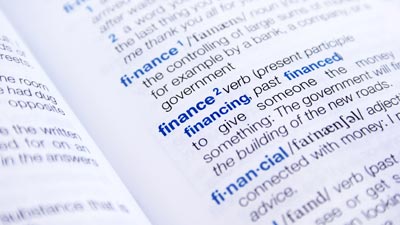Top 20 Financial Terms Every Loan Broker Should Know
 There are a plethora of financial terms that loan brokers should know and understand before entering the finance industry. Engaging in discussions with colleagues or clients discussing business matters will require you to have an in-depth financial vocabulary.
There are a plethora of financial terms that loan brokers should know and understand before entering the finance industry. Engaging in discussions with colleagues or clients discussing business matters will require you to have an in-depth financial vocabulary.
We highly recommend that you review the list below, but also read more financial based books that focus on your particular niche industry in finance. There are a lot more financial terms that are used in everyday business, but this article focuses on some of the more important terms we feel are necessary in the day-to-day operations o0f your business.
Below are the top 20 financial terms that loan brokers should familiarize themselves with in order to conduct themselves as respected finance professionals.
Financial Terms For Loan Brokers
Asset
A resource of money value, including cash, accounts receivable, inventory, real estate, machinery, collectibles, and securities.
–Current Assets– Assets that can be converted to cash within a year.
– Fixed Assets– Any long-term asset, such as a building, tract of land, or patent that will not be converted to cash within a year.
Balance Sheet
A firm’s financial statement that provides a picture of its assets, debts, and net worth at a specific time.
Current Ratio
Current Assets/Current Financial Liabilities= CR. The worth of a company’s assets divided by current financial liabilities, including short-term debts.
Depreciation
The decrease in value due to wear and tear, decay, or decline in price.
Net Income
Profit after taxes.
Net Sales
Amount of sale, found by subtracting returns and allowance from money collected for goods and services.
Net Worth
Value found by subtracting all liabilities from all assets
Liquidation Value Of Assets
Value of the assets if liquidated quickly to raise needed cash. Liquidation value is usually significantly less than the value if the assets were sold at fair market value.
Leasehold Improvements
Structural changes you make to lease space to make it suitable for your business needs. These costs may be paid by the landlord (included in your monthly rent) or you may be able to make some changes yourself and save money.
Co-Signer- Guarantor
A co-signer for a business loan is someone who guarantees that loan will be paid if the borrower defaults on the loan. A lender usually requires a co-signer when it needs more information or security to be assured that the loan will be paid off. The co-signer doesn’t just sign on the loan, he or she is making a promise to repay the loan if the borrower defaults.
Collateral
The assets you pledge in order to receive a business loan. Collateral may include business or personal assets, such as the equity in your home. If you have collateral, you can get a “secured” loan at better rates than if you had no collateral.
Liquidity
The more cash a business has on its balance sheet, the more liquid the business. Liquidity is also defined as the ability of a business to turn its assets into cash.
-Liquid assets are those assets, which can be turned into cash quickly with little or no loss of value.
Loan To Value (LTV)
A ratio determined by dividing the loan amount by the sales price or appraised value, expressed as a percentage.
Amortization
A process by which borrowers make monthly principal payments to gradually reduce their mortgage debt.
Bridge Loan
A short-term loan given to a borrower until permanent financing becomes available.
Cash- Out Refinance
Refinancing a current mortgage at a higher loan amount and taking the difference in cash.
Equity
The Difference between a property’s or asset’s market value and the outstanding loan amount.
Non-Resource Loan
A loan that is secured by collateral, but for which the borrower is not held personally liable. If the lender seizes the property and the sale does not cover the loan, the borrower is not responsible for the shortfall.
Seller Carry-Back
An agreement in which the seller provides financing for all or part of the purchase price.
Underwriting
Process used by lenders to determine borrower eligibility and ability to repay a loan. A number of factors are evaluated, including personal credit history, financial statements, employment history and salary.
This top 20 list of financial terms is primarily focused on terms that loan brokers should know and comprehend. Whether your focus is in economics, real estate financing, small business loans or personal finances, it is very important to learn and comprehend the vast amount of financial terms related to your business.









